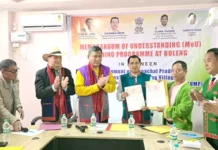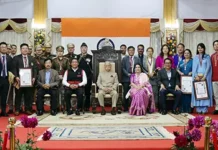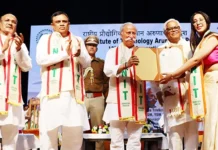Monday Musing
[ Taba Ajum ]
In the month of July, as the US forces started to withdraw from Afghanistan, the Taliban militants started to take over the country at lightning speed. It culminated with the militants entering Kabul and the then president Ashraf Ghani fleeing the country. No one thought that Afghanistan could crumble so easily after the withdrawal of US support. This shows that nation-building is never an easy task. Twenty years of US investment and deaths of many US soldiers all went in vain.
In 1947, when the British left India, the situation was chaotic. The country was divided into two nations and there was fear that India also might collapse when the British left. Now, when we look back, the nation owes its success to leaders like Mahatma Gandhi, Jawaharlal Nehru, Sardar Patel, BR Ambedkar and others. It may not be appropriate to make a comparison between India and Afghanistan, but one cannot help admiring the massive nation-building work done by the founding leaders of India in 1947.
For a country like India, which was highly divided on religious, ethnic, linguistic, regional, etc, lines, nation-building was a huge task in 1947. Therefore, the critical role played by India’s first prime minister, Pandit Jawaharlal Nehru, was very crucial. For a long time, Nehru has often been blamed for everything that is wrong in the country by right-wing Hindutva groups like the RSS and the BJP.
Having studied at a Vivekananda Kendra Vidyalaya (VKV) for a large part of my life, I used to strongly dislike Nehru. Eknath Ranade, the man who founded VKV, is considered one of the tallest RSS pracharaks. However, it was when I was doing my masters in Delhi that I started opening up to the Nehruvian ideology. And since 2014, when the BJP took over the power at the Centre, I have started to value Nehru the PM and his ideology and principle more. He was a man who was actually ahead of his time. While the newly-created Pakistan veered towards totalitarian Islamic regime, Nehru planted values of secularism and democracy and emphasized on modern science-based education. Institutions like IIT, ISRO, IIM, IISc, AIIMS, etc, were the brainchild of Nehru.
He gave wings to a poor nation like India to dream big by emphasizing on modern education. While giving utmost importance to educating the people, Nehru once said, “Education is meant to free the shackles of the human mind and not to imprison it in preset ideas and beliefs.” It does not mean that he was a perfect PM. He committed mistakes and learnt from them. Unfortunately, recently the Indian Council of Historical Research (ICHR) excluded Jawaharlal Nehru’s image from the poster of the Azadi Ka Amrit Mahotsav celebrations initiated by the council.
Nehru had his faults, but however much the Sangh Parivar might try, his historic contributions to India cannot be erased from the nation’s history.
Today, as the BJP regime at the Centre is destroying institutions after institutions and dividing the country on religious lines, Nehru’s value is felt more. He has become more relevant today. Even though right-wing groups continue to try to paint him as some kind of villain, the majority of Indians who love a secular, socialist, democratic India look up to Nehru for inspiration at this difficult time. As a proud tribal Arunachalee, I am grateful that Nehru after independence did not withdraw the BEFR 1873 regulations which were imposed during the British era. In fact, during Nehru’s era, Arunachal was left untouched. The tribal culture, tradition and customs flourished and education was given much emphasis. Even activities of Christian and Hindu missionaries were regulated during his era with a motive to safeguard the tribal culture, tradition and faith in its purest form. His biggest contribution was that he was committed to an India where the concept of equal rights of citizens would override all societal divisions. As India is grappling with deep religious division and attacks on its democratic values and institutions, the relevance of the Nehruvian ideology is felt more now.



